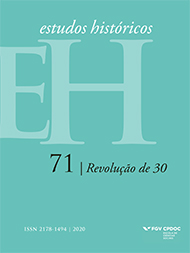Regulated citizenship and the Vargas Era: the interpretation of Wanderley Guilherme dos Santos and his critical fortune
Keywords:
citizenship, Revolution of 30, State, working class, conservative modernization.Abstract
It is intended here to evaluate the critical fortune of the concept of regulated citizenship, formulated by Wanderley Guilherme dos Santos, in order to point out how this became a central category in the efforts of Brazilian political thought in understanding the political and social order after the Revolution 1930. On the one hand, this concept allowed to identify some ambiguities of the so-called Vargas Era and continuities and ruptures between that period and the military dictatorship (1964-85), in addition to dilemmas and possibilities for the redemocratization of Brazil, although, on the other hand, it tends to idealize certain national cases of modernization, when compared to countries of later modernization.Downloads
Published
2020-09-01
Issue
Section
Articles


